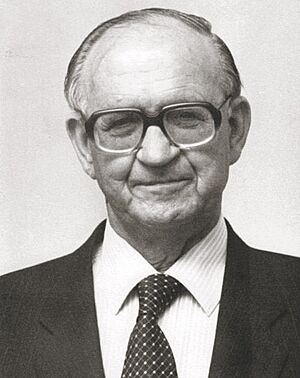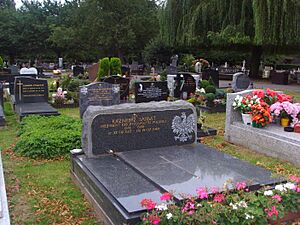Kazimierz Sabbat facts for kids
Quick facts for kids
Kazimierz Sabbat
|
|
|---|---|
 |
|
| President of Poland | |
| In exile 8 April 1986 – 19 July 1989 |
|
| Prime Minister | Edward Szczepanik |
| Preceded by | Edward Bernard Raczyński |
| Succeeded by | Wojciech Jaruzelski (As President) Ryszard Kaczorowski |
| Prime Minister of Poland | |
| In exile 5 August 1976 – 8 April 1986 |
|
| President | Stanisław Ostrowski Edward Bernard Raczyński |
| Preceded by | Alfred Urbański |
| Succeeded by | Edward Szczepanik |
| Personal details | |
| Born |
Kazimierz Aleksander Sabbat
27 February 1913 Bieliny Kapitulne, Russian Empire (today Poland) |
| Died | 19 July 1989 (aged 76) London, England |
| Cause of death | Heart attack |
| Political party | Independent |
| Spouse | Anna Sulik |
| Profession | Businessman, politician |
Kazimierz Aleksander Sabbat (born February 27, 1913 – died July 19, 1989) was an important Polish leader. He served as the President of the Polish government-in-exile from 1986 until his death in 1989. Before that, he was the Prime Minister of this government for ten years, starting in 1976. The Polish government-in-exile was a group of Polish leaders who continued to work for a free Poland from outside the country during and after World War II.
Contents
Early Life and Education
Kazimierz Sabbat was born on February 27, 1913, in a place called Bieliny Kapitulne. This town is located at the foot of the Lysa Gora mountain in what was then the Russian Empire, but is now Poland.
He finished his high school studies in Mielec. Later, he went on to study law at the famous Warsaw University. This was just before World War II began. Kazimierz Sabbat was also a dedicated Scout. He believed strongly in the values of Scouting throughout his life, even when he lived outside Poland.
Service During World War II
When World War II started, Kazimierz Sabbat joined the Polish military. He first served a short time in the Polish Navy. After that, he was assigned to a special unit called the Motorized Brigade. This brigade was led by a famous general named Stanisław Maczek.
During the Polish retreat in 1939, Sabbat was wounded. Despite his injury, he managed to make his way to Great Britain. In Britain, he was given a role in the British General Staff. He worked as an officer who was responsible for youth-related matters.
Life After the War
After the war ended, Kazimierz Sabbat was officially released from the army in 1948. He decided to start his own business in England. His business became very successful.
Even while running his business, he continued to help others. He volunteered his time for the Scouting Organization. He also worked with the Association of Polish Veterans. These were groups that supported Polish people living outside their home country.
Leading the Government-in-Exile
Kazimierz Sabbat became a key leader in the Polish community living abroad. He worked as an executive for the National Union, where he managed their Treasury Division. In 1976, he was chosen to be the Prime Minister of the Polish government-in-exile.
As Prime Minister, he worked hard to bring together different groups of Polish people living outside Poland. He also built stronger connections with people in Poland who were fighting for freedom. The government-in-exile provided moral support and financial help through various funds to these opposition movements.
In 1986, Kazimierz Sabbat became the President of the Republic of Poland (in Exile). He took over this important role from Edward Raczyński. He served as President until his death in London in 1989, at the age of 76.
It was a remarkable coincidence that on the very day he died, Wojciech Jaruzelski was elected as the first President of Poland inside the country since the 1950s. However, this election was not fully free at the time.
His Legacy
After Kazimierz Sabbat's death, Ryszard Kaczorowski became the next President in exile. Kaczorowski was Sabbat's Minister of Domestic Affairs and had been chosen as his successor.
On December 22, 1990, a very important event happened. After the first truly free elections in Poland since the war, Ryszard Kaczorowski officially handed over his powers to the newly elected President, Lech Wałęsa. This act symbolized the return of a free and independent Poland.
Kazimierz Sabbat is buried at Gunnersbury Cemetery in London. His wife, Anna Sabbat, who passed away in 2015, is buried there too. Their children still live near London, and he has eight grandchildren.


